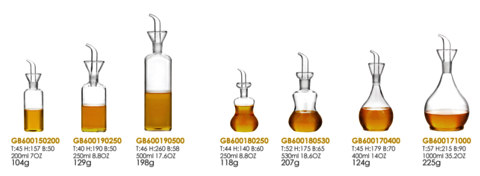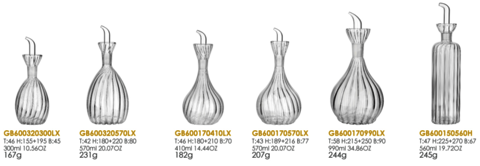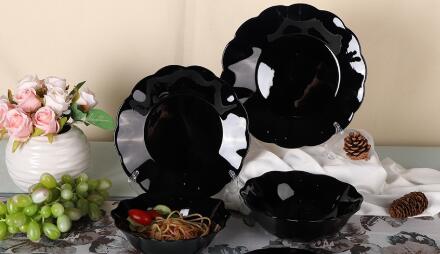The advantages of borosilicate glass olive oil bottle
Pulished on May. 14, 2023Borosilicate glass olive oil bottles offer several advantages compared to other types of glass or plastic bottles. Here are some of the key advantages:

Heat Resistance: Borosilicate glass is highly resistant to thermal shock. It can withstand extreme temperature changes without breaking or cracking, making it ideal for storing hot or cold liquids. This property is particularly important for olive oil, as exposure to heat can degrade its quality. Borosilicate glass bottles ensure the oil remains protected even in fluctuating temperatures.

Chemical Inertness: Borosilicate glass is chemically inert, which means it does not react with the contents of the bottle. Olive oil is a delicate substance that can be easily affected by external factors, such as light and oxygen. Using a borosilicate glass bottle prevents any unwanted reactions, preserving the taste, aroma, and nutritional properties of the olive oil.
Transparency: Borosilicate glass is highly transparent, allowing you to see the contents of the bottle clearly. This is particularly important for olive oil, as its color and clarity can indicate its quality and purity. By using a borosilicate glass bottle, consumers can assess the olive oil's appearance and make informed purchasing decisions.

Durability: Borosilicate glass is known for its durability and resistance to breakage. Compared to regular soda-lime glass or plastic bottles, borosilicate glass bottles are less likely to shatter or crack when dropped or subjected to impact. This ensures that the precious olive oil inside remains safe and intact, reducing the risk of wastage.
Non-Porous Surface: Borosilicate glass has a non-porous surface, preventing any interaction between the olive oil and the container. This property is crucial for maintaining the oil's flavor and preventing contamination. It also makes the bottle easier to clean, as there are no tiny pores for oil residue to cling to.
Odor and Taste Neutrality: Borosilicate glass does not impart any odor or taste to the contents of the bottle. This is important for olive oil, as it can easily absorb smells and flavors from its surroundings. By using a borosilicate glass bottle, the original taste and aroma of the olive oil are preserved without any interference.
Eco-Friendly: Borosilicate glass is a sustainable and eco-friendly material. It is made from natural raw materials, such as silica sand, soda ash, and boron oxide, which are abundant and widely available. Additionally, borosilicate glass bottles can be recycled repeatedly without losing their quality, reducing the environmental impact associated with single-use plastic bottles.

Aesthetics: Borosilicate glass olive oil bottles often have an elegant and premium appearance. The clarity and sleekness of the glass enhance the overall presentation of the product. This is particularly important for gourmet or artisanal olive oils, as the packaging plays a significant role in attracting customers and conveying a sense of quality.
UV Protection: Some borosilicate glass bottles are designed with UV protection features. Exposure to ultraviolet (UV) light can degrade the quality of olive oil, leading to rancidity and loss of flavor. UV-protected borosilicate glass bottles help shield the oil from harmful light, preserving its freshness and extending its shelf life.
Versatility: Borosilicate glass olive oil bottles come in various shapes, sizes, and designs, allowing for customization and branding opportunities. They can be fitted with different types of closures, such as cork stoppers or metal caps, to meet specific preferences and market demands.
In conclusion, borosilicate glass olive oil bottles offer numerous advantages, including heat resistance, chemical inertness, transparency, durability, non-porous surface, odor and taste neutrality









